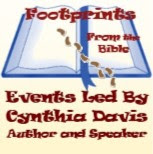The psalmist concludes Psalm 37 (verses 37-40) by exalting, “Mark the blameless, and behold the upright, for there is posterity for the peaceable. But transgressors shall be altogether destroyed; the posterity of the wicked shall be cut off. The salvation of the righteous is from the LORD; he is their refuge in the time of trouble. The LORD helps them and rescues them; he rescues them from the wicked, and saves them, because they take refuge in him.”
Each of the women we met over the summer learned that indeed “the Lord…is their refuge in time of trouble…because they take refuge in him.”
This week, we travel back to the very beginning of life as we know it. We come to Eve, the first woman. She has been blamed for millennia for eating the fruit of the forbidden tree. “You shall not eat of the fruit of the tree which is in the midst of the garden.” (Genesis 3:3) It cannot be denied that she “took some of its fruit and ate; and she also gave some to her husband, and he ate.” (Genesis 3:7) This representation by Domenichino show Adam telling God "she gave it me to eat." I think what is often overlooked is her reason for eating the fruit. “The woman saw that…the tree was to be desired to make one wise.” (Genesis 3:6).
Years ago I wrote a poem about Eve that explores her reasoning.
Eve’s Decision
‘You shall not eat of that tree’
Adam has told that to me.
He believes we will die—
But could that be a lie?
If God made us in love,
What would killing us prove?
I will look upon that tree
Just to see what I will see.
Perhaps the fruit is not good—
Poison, evil, not for food.
But maybe, the fruit is just right
Perfect and needed for new sight.
“Eve, why are you near that tree?
Now what do you want to be?
The tree for you holds knowledge
Between good and evil to judge,
So to become more like God
And the way of truth to trod.”
So now I stand by the tree,
And know that truth sets me free,
What change will come with the bite?
To eat or not, which is right?
Is to grow, to be weaned
What God for me has dreamed?
Looking now on the special tree—
Deciding to stay or to be free;
The garden is lovely and safe
But I know there is more to life.
God’s love wants me to be the best
Spread my wings, be put to the test.
“Eve, come now close to the tree,
You know that life has more to be.
Woman, you indeed are wise
This fruit is the price and the prize.
For you and Adam will still live
Free will is what God does give.”
I will take from the tree.
Accept what is to be.
Surely the gift is worth the price.
Knowledge of good and vice.
The garden life won’t be the same
But living free is the great gain.
Adam, come and share with me
The fruit taken from the tree.
The result makes us free and wise,
For free will gives us fuller lives.
Truth and knowledge we will know
God’s great love wants us to grow
Eve may have been mistaken in her reasoning and the result was that Adam and Eve were driven from the Garden, but note that “the Lord God made for Adam and his wife garments of skins, and clothed them.” (Genesis 3:21) Even though they had failed to obey God, they were not abandoned. Indeed, if you read a little further, God sends them out of Eden “lest he put forth his hand and take also of the tree of life, and eat, and live forever.” (Genesis 3:22) God did not want Adam and Eve (or us, their descendents) to live forever in alienation from God, so they were sent out of the Garden as protection against their own sinfulness.
Eve gained wisdom and knowledge of “good and evil” by her decision. We often fail to use that wisdom, though. The wisdom from the tree is incomplete without the love and guidance of God. We don’t see that God is providing for us all the time. The Psalmist notes, “the LORD helps them and rescues them; he rescues them from the wicked, and saves them.” (Psalm 37:40)
Since June, we have seen how God indeed rescued those who trust in God, sometimes even before they know who God is (like Rahab). I know that there have been times I recognized God providing help and I’m sure that there are many other times when God rescued, protected, and provided for me that I was oblivious to. What about you?
See you next week for a new chapter in our journey together this year.











